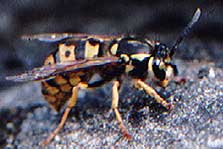Posted 24 April 2014
 Questions have been asked lately about what the Auckland Council is doing about the increase in wasps people are noting around Piha and the Waitakeres in general. I have received this update from Regional Parks and Biosecurity.
Questions have been asked lately about what the Auckland Council is doing about the increase in wasps people are noting around Piha and the Waitakeres in general. I have received this update from Regional Parks and Biosecurity.
Regional Parks is actively involved in the eradication of wasp nests In the Waitakere Ranges Regional Park, when we find them or are made aware of them. Together with a very passionate Ark in the Park volunteer we have killed well in excess of 200 nests in the last few weeks alone.
If you are aware of the location of nests that need attention please contact the Arataki Visitor Centre, phone 817 0077, with as much detail of the nest location and this will be dealt with.
Given the scale of the problem this year we will be taking a more aggressive approach next year as the populations appear to be building each year.
The council biosecurity team is also concerned about wasps and have provided the following information outlining their response to wasp management.
Four invasive wasp species are listed as a pest in the Auckland Regional Pest Management Strategy (RPMS) for the following reasons. They are a nuisance to recreational values, and a serious human health and safety risk via their toxic stings. Wasps have a major economic impact as they are competitors and predators of honeybees thus reducing pollination services to agriculture and horticultural crops. Wasps also cause major environmental damage to native biodiversity via their predation and competition for sugar resources on which many native bird species and native insects depend.
Under our current strategy, Auckland Council will carry out wasp control on its own land and, to assist alleviate the problem over the region, provides information on existing wasp control techniques available to the public and provides a referral service for wasp removal at landowner/occupier expense.
This season has seen increases of wasp populations not only across the Auckland region but nationally. There are two main reasons for this phenomenon being
1-Warm and dry weather stretching back well over a year is one reason for the large numbers of wasps this summer and early autumn.
2-The recent incursion and spread of a new pest species the giant willow aphid across the Auckland Region has led to a huge increase of food for wasps. Giant willow aphids produce honeydew, a favourite wasp food at this time of year.
In the past month or so wasps have hit the headlines numerous times after people discovered monster nests near their homes, or after the insects launched aggressive attacks. Council staff and contractors have controlled dozens of wasp nests this season but are struggling to make a dent in the population even in high use public areas.
Additionally, adding to the problem is that New Zealand currently lacks a suite of control tools to assist in the control of wasps across the biosecurity network. Lack of tools and lack of research funding to develop innovative technologies against this increasing pest has led to a national collective of researchers, industry, DOC, MPI and councils to form the Wasp Tactical Group (WTG) of which Auckland Council is a member. The wasp tactical group recently met again in March and have identified a range of promising research projects that require funding support to develop the urgently needed wasp control technology.
Auckland Council has also prioritised wasp control research as a high biosecurity need for its operational management of wasps in the region and to date has co-funded an Envirolink project for AgResearch and a University of Auckland studentship, to develop biological control methods.
In response to the recent public complaints including serious health & safety sting incidents has led to extensive media coverage and articles related to the problem nationally. Our WTG spokespeople Associate Professor Phil Lester (Victoria University) and Dr Darren Ward (Landcare Research) have been interviewed about the problem and have alerted to public to the menace but also our urgent need for wasp based research http://i.stuff.co.nz/science/9875297/Huge-wasp-numbers-concern
Council’s Biosecurity team is actively engaged and supporting research into more solution-based approaches.
http://www.doc.govt.nz/conservation/threats-and-impacts/animal-pests/animal-pests-a-z/wasps/


